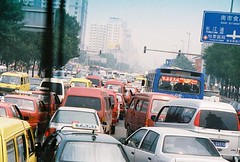Cheap Gas is a bad habit (and increasingly nonexistent)
 "Danger Will Robinson!" As the robot used to say on the tv show "Lost in Space", "That does not compute."
"Danger Will Robinson!" As the robot used to say on the tv show "Lost in Space", "That does not compute."Robert Samuelson writes in his column today that:
What this country needs is $4-a-gallon gasoline or, maybe, $5. We don't need it today, but we do need it over the next seven to 10 years via a steadily rising oil tax. Coupled with stricter fuel economy standards, higher pump prices would push reluctant auto companies and American drivers away from today's gas guzzlers. That should be our policy. The deafening silence you hear on this crucial subject from the White House, Congress and the media is a sorry indicator of national shortsightedness.
Hurricane Katrina's message is clear: We are vulnerable to any major cutoff of oil. This cutoff came from a natural disaster, but the larger menace is a political cutoff. Two-thirds of the world's proven oil reserves lie around the Persian Gulf; these countries, led by Saudi Arabia, now provide about a quarter of today's oil supply. This flow could be interrupted at any time for many reasons -- terrorism, war, domestic upheaval, deliberate cuts...
"It's going to take a long time," says Walter McManus of the University of Michigan Transportation Research Institute. "You've got 225 million vehicles out there. It's about 15 years to turn over the fleet." Actually, the math is worse than that. From 2003 to 2025, the number of vehicles may grow by 50 percent, projects the Energy Information Administration. The increase reflects more people (from today's 297 million to 351 million in 2025) and higher incomes. The upshot: To keep total gasoline consumption constant, average fuel efficiency must improve by roughly 50 percent.
________
How is this kind of thinking possible?
While improving vehicle fuel efficiency is an absolute necessity, if the worldwide supply of oil currently exceeds worldwide demand by 1.5 million barrels/day, and China consumes far less oil per capita than the U.S., how can forecasters conceive that adding 100 million vehicles is possible given the current supply of oil. If the U.S. were to consume all of the overage, that would allow a bit more than one gallon of gasoline per day to each of these new vehicles. But don't forget China.
The current system of automobile dependency is unsustainable, even if vehicles efficiency is to be increased by 50%.
Over the past few days, a number of newspapers have run articles about an increase in transit use and car pooling (New York Times, Baltimore Sun, Richmond Times-Dispatch, Philadelphia Inquirer). Previously all the press seemed to focus on how people were still driving. Meanwhile consumer confidence and expenditure studies are finding other measures that people are taking to compensate for increased gasoline prices (fewer meals out, etc.).
Location decisions for work and residence must take into account transportation costs, travel efficiency, and alternative transportation options.
For more information, check out Energy Information Administration pages on the U.S. and China
the U.S. consumes about 19 million barrels/day of oil.
China about 7 million.
and population figures from the CIA Factbook
U.S. population = 295,734,134
China population = 1,306,313,812
 China.
China.



0 Comments:
Post a Comment
<< Home